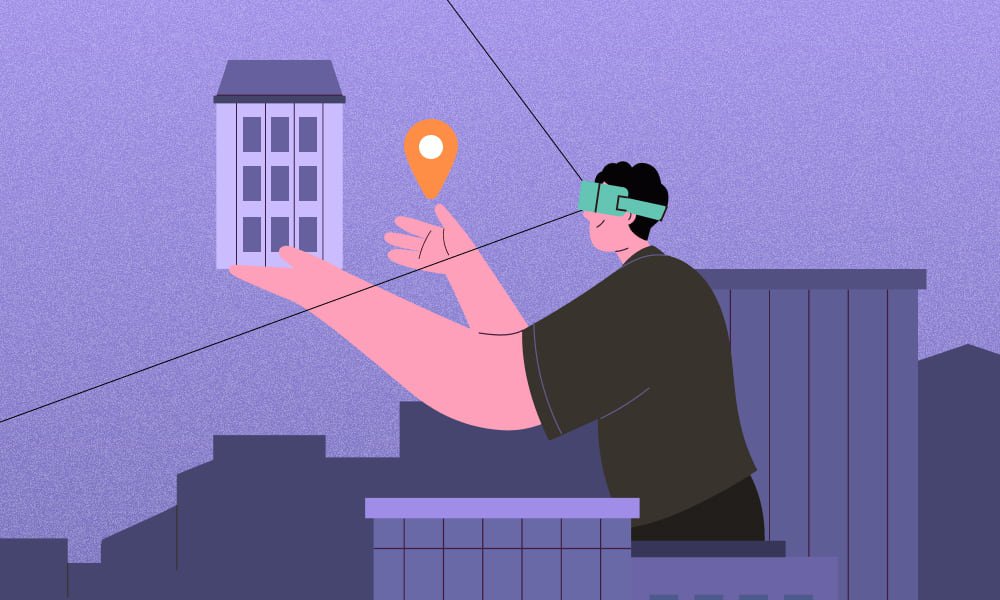The remarkably wide range of potential use cases for metaverse means it’s only a matter of time before the concept becomes a normal part of reality everywhere, no longer being limited to a few industries such as gaming and entertainment.
The possibilities of the metaverse touch on all areas of our lives and offer us new options for using virtual reality. Virtual venues can be created for events and small gatherings in the metaverse, land can be sold, houses can be purchased. Immersive travel is possible too.
This article will help you identify potential use cases for the Metaverse, as well as the myriad benefits associated with it.
Metaverse essentials you should be aware of
Before finding out where the metaverse technology is heading, we need to understand the fundamentals.
The Metaverse consists of a 3D virtual world where users interact with various spaces and virtual reality components using digital avatars. As we write, the largest IT companies, such as Facebook and Microsoft are busy exploiting its potential. It’s likely that in the coming months we will see the notion of 3D virtual reality in metaverse projects embodied in a range of spheres — from a virtual land market to office space.
You can find out more about this highly promising technology in our article.
Metaverse key prospective use cases
Metaverse is a broad concept. Below are the key areas, such as games, working environment, tourism, education, etc. where thousands of VR developers from all over the world are already working.
Games

The gaming industry is seen as one of the core investors and popularizers of metaverse technology. Metaverse technology was first implemented in the world of computer games, and this is not surprising, since it allows players to interact with other participants in a single virtual interoperable environment.
Projects as The Sandbox, Axie Infinity, Sorare, and many others are already successfully operating. For instance, Axie Infinity has over 350,000 active daily users. The goal of the game is to collect “Smooth Love Potions” (SLPs). SLPs act like cryptocurrencies that can be bought and sold on a crypto exchange. Top players can earn 1,500 SLP per day ($435) on their “Axies”, although the SLP to dollar exchange rate is constantly changing.
Metaverse games have some specific characteristics:
- The game product acts as a platform that provides gameplay flexibility and allows participants to create their own content and games within and according to the rules of a specific metaverse.
- Games represent a fully-fledged social environment in which it is possible to contact other users; this fundamentally distinguishes metaverse games from regular VR games.
- The ability to play and earn cryptocurrency is the defining economic component of metaverse gaming, so now the gameplay can bring not only mental but also material satisfaction.
- Due to the compatibility of the metaverse architecture, the portability of in-game NFT assets ensures permanent ownership of specific digital assets.
- A mixed reality experience allows players to easily and seamlessly switch between different formats of interaction with the virtual environment.
Check out the article on GameFi – a new popular term among the crypto community
Working environment
The growing popularity of metaverse technology is bringing significant changes to the traditional business processes. Projects that are being rolled out today will enable:
- Remote work in virtual space. The introduction of the metaverse will make the employee’s physical presence in the office unnecessary.
- Interaction with colleagues in workrooms. With the advent of virtual offices and the development of metaverse technology, communication and collaboration in coworking spaces will be realized via virtual reality devices, and the traditional office will become obsolete.
- Organization of remote meetings. Today, these meetings are conducted on Skype and Zoom, but thanks to the development of metaverse technology they will one day be held in a virtual room, where each participant will be present as an avatar.
Many companies are already working on the creation of virtual business infrastructure. Virtual office companies include well-known, billion-dollar corporations like Nike, McDonald’s, YouTube, The Walt Disney Company, and Intel, alongside small but ambitious startups such as Inworld AI, Upland, and Gravity Sketch.
Tourism
One of the most forward-looking ways to use metaverse is virtual tourism. Technology lets you travel in a virtual space, so you don’t have to physically visit the locations that excite you. Experts claim that the creation of an immersive digital environment combining virtual and augmented reality will be a breakthrough in the field of virtual tourism. A digital space filled with realistic content may become a product that will, in part, replace traditional tourism.
We’re already witnessing the start of 360-degree virtual tours. However, with the introduction of the metaverse technology, you will not just watch the video tour recorded by a guide, but actually be present in the tourist location you are interested in. Moreover, you can visit this place with your family and friends, which will make your experience all the more realistic.
Imagine for a moment that you are walking among the paintings of Van Gogh or Picasso in the metaverse gallery: it’s not hard to appreciate how the introduction of the metaverse could transform the tourism landscape.
Virtual reality has already gained significant traction in the sector. For example, with the help of Visualize, Thomas Cook launched the Virtual Reality Holiday ‘Try Before You Fly’ service, which allowed potential tourists to visit holiday destinations in virtual reality. Having experienced this service, the customer could decide whether they wanted to go on a real trip. The results were stunning. For example, the number of booked tours in New York doubled after people went on a 5-minute journey in virtual reality.
Meet QTS – a VR real estate solution for generating 360-degree virtual tours
Education

The educational potential of the metaverse looks just as promising. Metaverse technology is fundamentally changing the approach to learning. Virtual reality can bring the visual component of the educational process to a qualitatively new level, allowing students to ‘live’ a specific experience, which provides more intensive and high-quality assimilation of knowledge than traditional classroom training.
The metaverse can transform the learning process and create a truly effective learning environment. Just imagine an astronomy lesson that takes place not in a classroom, but in a spaceship.
We should mention that the virtual learning environment might also eliminate the language barrier. The technology could allow people from different countries to study in a single virtual space without social or linguistic complications.
The introduction of the metaverse school and virtual learning space will enable people from the most remote corners of the world to receive a quality education in conditions perfectly adapted for the assimilation of new knowledge and experience. For example, Microsoft has created Mesh, a mixed reality platform where students, faculty and staff can interact using their 3D avatars. They will be able to use Microsoft HoloLens to interact in an immersive classroom or see avatars in a traditional video conference. It’s therefore clear that the question of how to use metaverse in education has dozens of good answers.
Fashion
As one of the most progressive areas of the economy, the fashion industry is actively introducing new trends related to the metaverse technology. The most striking example is Gucci, which created the “Metaverse design” category on Roblox. Users can already buy exclusive outfits from the famous fashion house on the gaming platform.
A while ago a digital Gucci bag was sold for $4,000 on the platform, an indication that the virtual fashion industry is already becoming a significant source of profit for the leading market players.
In light of the increasing popularity of NFTs, the day will come soon when the exclusive virtual collections of all famous fashion houses will be sold for millions of dollars on numerous fashion websites and in virtual boutiques.
Shopping

Many entrepreneurs these days are keen on the potential of virtual reality, insisting that online shopping will soon evolve from a two-dimensional interaction into an amazing virtual experience. This experience will be free of the limitations of the physical world — but will still retain its advantages, such as the chance to try on, feel, and test the product or to get online advice from the seller.
Similarly, many experts believe that one of the most promising applications of metaverse technology is virtual shopping, which offers the possibility of becoming the owner of the purchased product or service in the real world. In the near future, it will no longer be necessary to visit malls. At the same time, virtual shopping in a metaverse supermarket will replace online shopping.
Zara has presented its first collection for people and avatars. Physical and virtual models can now be purchased at network stores anywhere in the world. The collection was developed in collaboration with a South Korean clothing brand, Ader Error.
In the ADERERRORXZARA virtual store on the Zepeto platform, all the items from the innovative collection are available. Thus the famous Spanish retailer is taking its first step into Web 3.0. The Zepeto platform is an incredibly popular meta-universe with more than 200 million users and a high growth rate over the past year.
Nike too has boarded the virtual goods train. The company has already opened Nikeland, a virtual showroom on the Roblox gaming platform where visitors can dress up their avatars in Nike apparel and shoes. At Nike’s virtual headquarters, users will be able to socialize, compete in different sports, and create their own mini-games. The sportswear giant also announced the acquisition of digital sneaker maker RTFKT.
Social networks/entertainment
With a push from some energetic promotion, the metaverse technology will radically change the world of social networks and online entertainment. This is because in the metaverse users get a much deeper immersion in the digital space than in the traditional messengers and blogs.
If social networks and metaverse entertainment platforms currently equate to two-dimensional ecosystems, soon they will evolve into full-fledged metaverses and become separate virtual planets, where people will spend time not chatting or scrolling through the photos, but communicating through their avatars or virtual clones.
Facebook has already changed its name to META, an obvious signal of the direction in which the largest social networks will develop. And with the arrival of widely available virtual reality tools, we will see an explosive development in this area and a massive transition of users from the traditional web to the metaverses.
Real estate

One of the core features of the metaverse is its ability to provide a client with the ultimate virtual reality experience. It’s no surprise that in a market niche as profitable as a metaverse property sale this option can be used in order to optimize the display of buildings for sale/rent.
The estate agents don’t have to travel to the site, and the clients don’t need to waste their time viewing dozens of houses, apartments, offices, or shops. Prospective buyers will instead be able to take a metaverse real estate tour, which will be almost indistinguishable from the experience of actually being there on the premises. Any client will be able to explore all options in real-time.
Moreover, a virtual tour can be adapted to specific tastes. Design, scaling, and soundtrack can all be customized for the individual client. In addition, augmented reality in the form of popups will make a metaverse virtual real estate site visit even more informative and useful.
In the four largest metaverses (Sandbox, Decentraland, Cryptovoxels, and Somnium), virtual real estate sales exceeded $500 million last year, and there is every chance they will reach the $1 billion mark this year. Brandessence market research experts predict that from 2022 to 2028 the market will grow by 31% annually.
At present about 100 Fantasy Islands are being developed in the Sandbox metaverse. They have villas with amenities such as boats and jet skis. Ninety islands were sold, at an average of $15,000. Some had a price tag of $100,000. Meanwhile, Republic Realm has reportedly paid a record $4.3 million for virtual land.
Introduce yourself to VResorts – a VR platform for hotel and resort owners
What are the challenges in creating the metaverse?
Although today many consider the metaverse a promising technology that can lead the way to fully immersive virtual reality, it is still a “grey area”. In other words, so far the industry lacks the capacity to conduct a comprehensive study of the risks posed by the metaverse technology.
The main challenges faced by the metaverse developers are as follows:
- Identity and reputation problems. The issue is how a person will be identified in a virtual environment. After all, in theory any other person or even a bot can easily imitate you in the metaverse. This is why reputation should be a key element of authentication and proof of confidence in a specific object. However, there remains a risk that facial features or voices could be faked.
- Data security issue. The development of metaverse technology makes it necessary to raise cyber security measures to a radically new level. There will be a need to create new approaches to the protection of personal data, privacy, and digital property. It is reckoned that in the metaverse environment users may be required to provide much more personal data than they do today in order to guarantee more accurate identification and enhanced security.
- Financial system problems. It is already clear that metaverse will implement its own version of the virtual market, which would combine fiat money and cryptocurrencies and ensure their fast and secure exchange. This will create the need for a new unique transaction verification system to safeguard the security of users’ finances.
- Legal regulation problems. With the introduction of virtual spaces, it will be necessary to establish the laws that will govern the industry. The Metaverse is extremely vulnerable in terms of the rights of its participants, since it is not legally regulated.
- Property issue. One of the chief tasks of metaverse developers is to create a single system that could provide digital asset verification analogous to NFTs’ proof of ownership in the real world.
- Community problem. The metaverse must be a place where users can feel they are members of a single community and maintain good working relationships. For this to happen, haptics and motion capture technologies must improve significantly.
- Perception of space and time. Being inside a virtual reality, a person perceives time and space differently. Full immersion in the metaverse can result in users spending much more time in virtual reality than they had planned, raising the question of how the user will keep in touch with the real world while experiencing distorted time inside the metaverse. As for the perception of space, the problem here is that the meta universe is infinite, which means new users will find it difficult to adapt to an enormous volume and diversity of information.
These key obstacles faced by the metaverse developers are likely to prove readily solvable in time. However, meanwhile they all require high ethical standards and original engineering solutions from the architects.
Want to know the role of blockchain in metaverse development? We’ve got it covered already
Conclusion
Humanity is on the cusp of a new era. Virtual reality is set to become embedded in the lives of every one of us. The concept of metaverse virtual worlds has already gone well beyond computer games, and is gradually expanding into areas such as the economy, communications, entrepreneurship, education and art.
At the same time, the creation of a virtual universe poses a number of challenges that have yet to be resolved — even as it hides a host of opportunities. The metaverse must not be a replacement for the real world, but represent an improvement on it in every possible way. This is the main responsibility of the developers.
PixelPlex can bring to fruition any concept you have in mind, from mobile applications to complex cross-platform corporate projects. We provide a comprehensive technological upgrade for your company, helping you to launch innovative projects and optimize software testing costs. Blockchain and integration, creation of an end-to-end DeFi solution, NFT development, and so much more — the possibilities are almost unlimited.
Do you still have questions about the use cases and applications of the Metaverse? If so, contact us, and we will gladly provide you with a consultation.
原文链接:https://pixelplex.io/blog/top-metaverse-use-cases/

